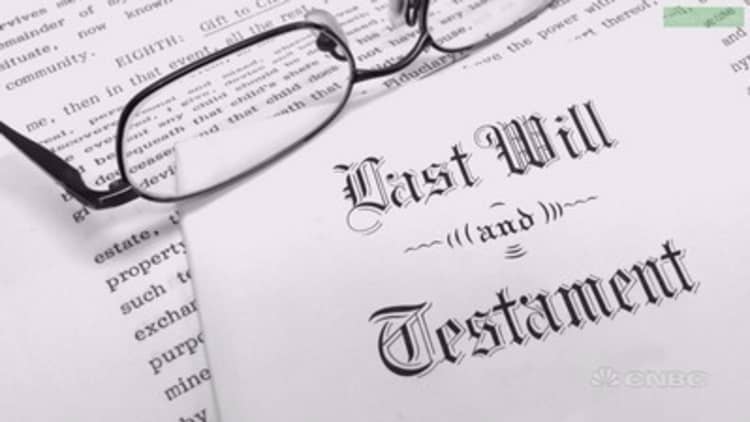
The fate of Prince's estimated $300 million estate hangs in the balance as the search for his will continues.
Without that important document, the music icon's family is being forced to rely on the decisions made in probate court to determine what will happen to everything the superstar left behind, including a trove of unreleased music.
Having a will is just as important for ordinary folks as it is for multimillionaires. If you own any personal property, including a home and bank account, you qualify. Having an estate plan will preserve your wealth for future generations and make sure your wishes are carried out in a timely and civil manner.
Remember, the point of a will is to protect those you leave behind. So even though it's not pleasant to think about, you need to plan for the inevitable.
Here's what you need to know.
Start by making a list. The first step in creating a will is to take inventory of your belongings and valuables.
"Get everything together and figure out what you want to do in terms of who gets what, and that will determine how complex your estate plan needs to be," said Josh King, chief legal officer at Avvo, an online marketplace that rates lawyers and connects users with estate-planning attorneys in their area.
When you make that list, be sure to include all your debts, property and other assets you own. Then decide who you'd like to inherit these items. If you have children, make sure you assign guardians as well.
Set up a trust if you have significant assets. A trust will allow you to transfer your assets to your beneficiaries after your death without the courts being involved.
"A trust could allow the owner to control the assets during his or her lifetime and then set forth what will happen to those assets upon their death, including bequests to loved ones and insuring charitable intentions are achieved," said Lori Anne Douglass, an estate-planning attorney at Moses & Singer in New York.
Wills normally become a matter of public record upon probate, but a trust may often provide greater confidentiality, as they are often used to avoid probate, added certified financial planner P. Jeffrey Christakos of Westfield Wealth Management.
Don't forget the letter of last instructions — a letter that puts your final wishes in plain language.P. Jeffrey Christakoscertified financial planner at Westfield Wealth Management
Pick your key players. Once you've made those tough decisions, the next step is designating someone you trust to carry out those wishes after your death. That person is called an executor and can be anyone you choose, from an adult child to a close friend.
The second person you'll need is called a durable power of attorney. This person will have the legal authority to handle financial matters. Without one, your spouse, children or other loved ones won't be able to take care of even the simplest tasks, such as paying off bills in your name.
Draft a living will and assign a medical power of attorney. A living will is a separate legal document that states whether or not you want life-sustaining treatment if you're incapacitated and can't make decisions on your own. Your medical power of attorney gives someone the legal right to make those decisions.
Update your beneficiaries. Look over your bank, brokerage, insurance and retirement plan accounts to make sure they are up to date. You want to ensure that your assets go to the right people.
For retirement plans, "it's important to remember they are subject to income taxation whenever any money is taken out, so the beneficiary designation is especially important if you want to defer an immediate income tax hit on the entire amount," said Douglass at Moses & Singer.
Finally, include a letter of last instructions. "Don't forget the letter of last instructions — a letter that puts your final wishes in plain language," said Chistakos at Westfield Wealth Management.
"It also adds color to the requests," he added. For example, you may want to specify what you or your loved ones wear to the funeral.
Need estate-planning advice? Consult a financial advisor and estate-planning attorney. Visit the Financial Planning Association website at fpanet.org or National Association of Personal Financial Advisors at napfa.org to find a financial advisor in your area. Look for an attorney who specializes in wills and trusts through the National Association of Estate Planners and Counsels (naepc.org) and American College of Trust and Estate Counsel (actec.org).
Avvo also offers fixed-price legal services at various levels. For $295, you can get your last will and testament drafted by a local attorney. For $895, a couple can work with an attorney to create a last will, power of attorney and living will.
LegalZoom also has fixed-priced forms for you to write up your own will for $69; for $79 you'll also get one phone consultation.
The bottom line is, you should get all of your affairs in order now — before the inevitable happens.







